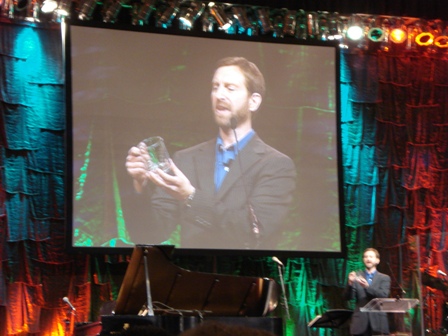Summary of Mike Emlet’s Plenary: ‘Groaning and Glory: The New Testament and Addiction’ (CCEF Conference Live Blog)
Mike Emlet started off by showing us one of his prized possessions: a mug. No ordinary mug. It’s a pessimist’s mug; bought for him by a formal intern at www.despair.com. (I kid you not.)
What makes this a pessimist’s mug? Half way up, there is a line and the words, “This mug is now half empty.”
And with that, Dr. Emlet began his plenary session …
Can you resonate with despair.com? Pessimism? I now know Mark Driscoll does. Do you? Or are you a cup half full kind of person?
More specifically, when it comes to the battle with life-altering sins, what should have? How much change can we really expect in this life?
We want to believe in a cup half full, or at least a ‘quarter full’ mentality. But so often our experience is otherwise.
– A craving leads to weeks of drunkenness.
– Defensiveness springs to life immediately when someone criticizes us.
– One last indulgence in pornography nails shut the coffin on your marriage.
What sins of the flesh are you dealing with now, perhaps years after coming to Christ? Do you ever wonder, ‘Does anything ever change in my life?’ I do.
No matter how you understand what Paul says in Romans 7:18-19, there is an acute tension. “What I do is not the good I want to do; the evil? This I keep on doing.”
On the other hand, there are moments in the Christian life when His power and glory are so real, we can almost taste it. And we think, “Maybe this sin is gone! Victory is ours!” And then we fail.
So were we foolish to hope? Wrong to hope?
With any besetting sin, whether we are in it ourselves or helping someone who is caught in it, our tendency is to go between heights and depths. But the Bible offers something different from extreme pessimism or breezy optimism. The Bible shows us, when it comes to progressive change, we are to have a hopeful and hope-filled realism because:
– Our Hero, Christ, has arrived!
– The enemies (sin and death) have been defeated.
– Our thirst is quenched by Jesus, Who is Himself living water.
– We know where we are headed; and God gives us a taste of that now in the Spirit.
But we don’t feel the full benefits of that restoration now.
So we look at our lives and the world around us and we cry out, “This is not the way it’s supposed to be!” We can’t help but live in that tension because of the way that God brings that redemption to us in the Lord Jesus Christ.
There is both a present and future manifestation of God’s redemption in our lives. This has profound implications for how we live. “The already and not yet.”
Hopeful realism celebrates the coming of God’s redemption that is to come.
Hope is an experience in the present that is rooted in the surety of the future.
Hope is rooted in the fact that God the Father has acted decisively to renew creation and that He has given us His Spirit.
Watch out for subtle signs that your hope may not be in keeping with the reality of God’s Kingdom:
-A quiet, creeping cynicism that begins to scale back what God can and will do in your life and the lives of those you love
– A quiet, cup half-empty mentality that quenches joy and your prayer life
The Scripture gives us lenses of hope. We gain perspective. Hope is stirred. Today’s failure or success is not the end of the story. We need to become caught up in a story that is bigger than ourselves.
Scripture calls us to live out hope-filled realism.
Christ has died. Christ is risen. Christ will come again. We live in the tension between Christ’s resurrection and return. We live in the groan and we press forward to taste that certain future.‘

